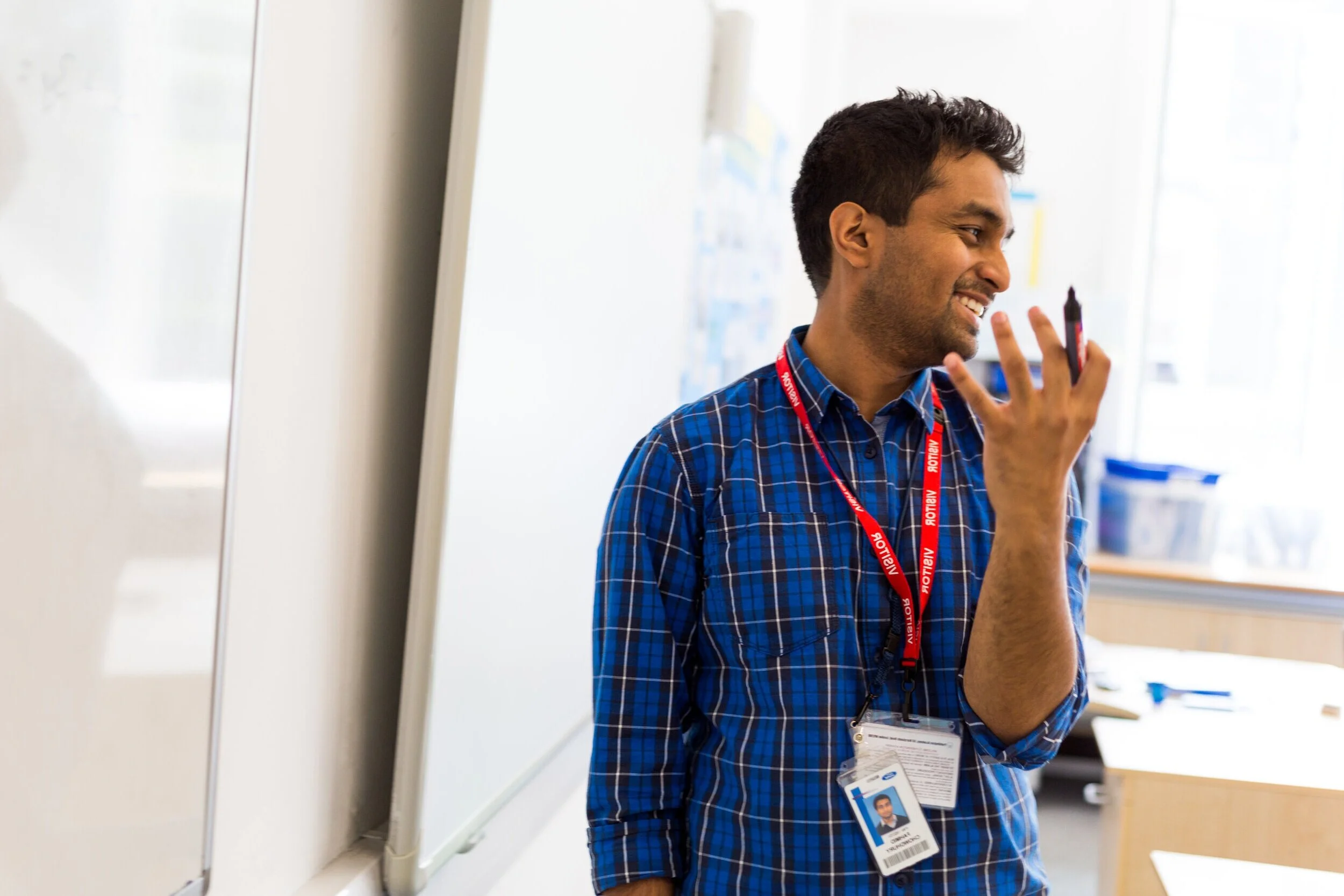
About Maths Circles
For teachers and school leaders…
New schools and students are always welcome to join the Maths Circles programme. If you would like to register your school, and/or nominate students to take part, you can do so here or using the button below.
If you are a parent/guardian and would like to nominate your child, you can do so here.
What are Maths Circles?
A Maths Circle is a small group of students who gather with a mentor to be mathematicians together. Circles meet online, after school and sessions typically last for one hour each week over several school terms. Circles are made up of no more than 6 students.
In their Circle, students will…
grapple with (but not always solve!) intriguing problems and ideas.
learn to think, speak and work like a university mathematician.
sometimes think on their own, sometimes think in a team.
enjoy getting stuck as well as getting unstuck.
have fun themselves, and make it fun for everyone else too.
Mathematical circles take place in many countries. The term is used for a wide variety of ways of organising mathematical activities for young people of many different ages and stages of mathematical education and development. AXIOM has adapted the underlying ideas of these different mathematical circles to the UK context, drawing inspiration from a global range of mathematical circles to develop a rich, engaging curriculum. Tutorfair Foundation is delighted to be an official Delivery Partner for AXIOM Maths Circles.
What is studied in a Maths Circle?
The areas of study in the AXIOM curriculum are chosen to build on what students will have already learnt at school, but also to allow them to progress systematically through a network of related ideas in areas which develop deep mathematical significance: for example, combinatorics and geometry. Students increase and improve their factual knowledge and procedural fluency as they do so. The focus of a Circle session is the underlying mathematical structure of the content.
Topics are loosely organised within strands, so that, once an idea has been encountered, the concept is reinforced and its use practised when that strand is revisited in one or more subsequent Blocks. Within strands, specific content has been chosen because it provides plenty of opportunities for students to reason mathematically, in an increasingly ambitious way, but with only a manageable level of technical apparatus and a limited dependence on where students have reached in the school curriculum.
The long-term sequencing of the AXIOM curriculum and the specific task design in each session enable mentors to apply research-validated principles of effective pedagogy, including that:
tasks should develop mathematical understanding
learning needs to be broken down into steps
unnecessary cognitive load should be avoided
problem-solving is not a generic skill
practice needs to be purposeful
practice should be spaced, so that new ideas are regularly reinforced
learning should not be easy: ‘desirable difficulties’ catalyse deeper processing
productive struggle is essential:
students should experience creative mathematics and be expected to generate mathematics for themselves.
The AXIOM Maths Circles curriculum is being designed and developed by a team of mathematicians, teachers and experts in teaching and learning. The problems are written, and sequenced, based on extensive pedagogical research and decades of experience in the classroom.
We have a session you can download, for you to get an idea of the materials and curriculum, and trial with your students. Click the link below.
How do students develop through Maths Circles?
The tasks in each Circle session catalyse productive student-mentor and student-student dialogues. Through these dialogues, and from long-term participation, students develop confidence in sophisticated mathematical behaviours such as
understanding and using for themselves formal mathematical language;
understanding logic and what constitutes a rigorous proof;
restructuring their prior learning so that it can be used in diverse contexts;
re-expressing a problem in mathematical terms;
knowing how to put together a strategy for solving a problem from a series of familiar techniques;
reading mathematical arguments and distinguishing true and false statements and valid and invalid claims;
generating their own mathematical arguments;
working in a group, in particular the academic interpersonal skill of explaining an idea or a proof to someone else, listening to what they say, and then responding constructively to their response;
thinking of themselves as mathematicians;
being resilient in the face of difficulties;
being persistent when a significant amount of systematic work is required, or when a problem does not succumb to their initial approach.
Frequently asked questions…
Which of my students should I nominate?
The questions, tasks and explorations in Maths Circles have been carefully created to support, challenge and develop students with an aptitude and passion for mathematics. Therefore, we recommend you select students who:
Achieved “Greater Depth” in their KS2 Maths SATS. This year, this corresponds to a score of 111 and above for disadvantaged students, and 113 and above for other students.
Are showing you that they are enthusiastic mathematicians, for example by their engagement in lessons, their interest in maths puzzles, or by their participation in UKMT maths challenges.
We are especially keen that you nominate high prior attainers from disadvantaged socio-economic backgrounds. We want at least 30% of the students taking part from your school to be eligible for Pupil Premium funding. All students must be in Year 7 or 8 this coming January.
How many students can participate from my school?
Students are selected based on their alignment to the criteria above. If selected, they will take part in groups of six with students from different schools. There is no limit on the number of students that you can nominate for the programme.
What is required from the school?
When nominating students from your school, we’ll ask you to provide some data about them including their names, parent/guardian names and contact details, Pupil Premium status and KS2 Maths attainment. Once you have nominated your students, Tutorfair Foundation will take care of all of the administration and delivery of the programme which will operate independently of school.
